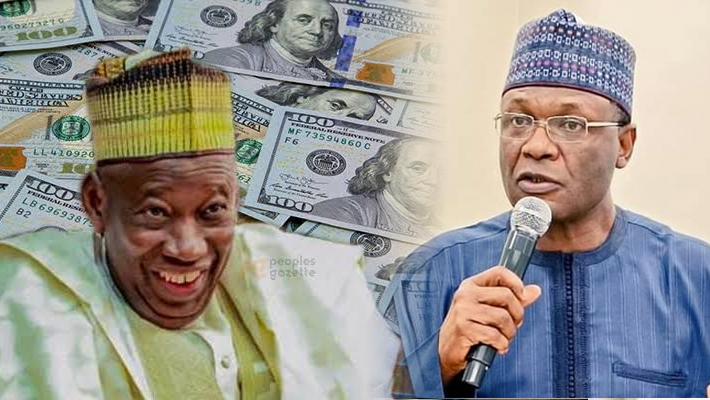
News
Nigeria’s Corruption Dilemma: Ganduje Points Finger at Unexpected Sources

(iexclusivenews) – In a surprising turn of events, former Governor Abdullahi Ganduje and Bishop Mathew Kukah, founder of The Kukah Centre (TKC), have shed light on the complex issue of political corruption in Nigeria.
Their insights, shared during a high-level meeting with national executives of political parties and other stakeholders in Abuja, challenge conventional wisdom and offer a new perspective on the root causes of corruption in the country.

Poor Nigerians and Weak Institutions
Ganduje’s Controversial Stance:
Former Governor Ganduje, currently embroiled in a corruption case in Kano, made a bold claim that has sparked debate across the nation.
He asserted that blaming politicians and public officeholders alone would not solve the problem of weak institutions in Nigeria.

Instead, he pointed to an unexpected source: dishonest poor Nigerians.
Ganduje stated, “Let us not be blaming the politicians, officeholders, those who win elections. Yes, we blame them, but let us look at the security system, the Independent National Electoral Commission (INEC) that oversees the election.”
The Role of INEC and Other Institutions
The former governor’s comments highlight the critical role of institutions like INEC in maintaining the integrity of Nigeria’s democratic processes.
He emphasized that these institutions are responsible for manning polling booths and overseeing elections, suggesting that corruption at this level contributes significantly to the overall problem.
READ MORE: Kenya In Turmoil As Deadly Protests Shake Ruto’s Government
The Poverty-Corruption Nexus
In a particularly controversial statement, Ganduje claimed,
“Even the poor man is not honest. If we are to go into details of what happens practically, you will see voters saying they cannot vote until they are paid.”
This assertion raises important questions about the relationship between poverty and political corruption in Nigeria.
Bishop Kukah’s Perspective:
Bishop Mathew Kukah, moderating a panel session at the event, offered a more nuanced view on the issue of institutional weakness.
He emphasized the importance of learning from past mistakes and developing mechanisms to prevent their recurrence.
Kukah stated, “Institutions are supposed to be a mirror reflecting the aspirations, the fears, the hopes, and the anxieties of an entire people.”
He stressed that strengthening institutions is a collective responsibility that requires all Nigerians to stand against practices that undermine these institutions.
The Role of Political Parties:
Both Ganduje and Kukah acknowledged the weakness of political parties as a contributing factor to corruption.
They emphasized the need for stronger, more accountable political organizations to foster a healthier democratic environment.
Moving Forward: Strategies for Combating Corruption
Learning from the Past:
Bishop Kukah emphasized the importance of learning from past mistakes to build stronger institutions and a more robust democracy in Nigeria.
This approach involves critically examining historical failures and successes to inform future policies and practices.
International Support:
The event highlighted the role of international partners in strengthening Nigeria’s democratic institutions.
Kukah commended the European Union for its efforts, particularly in developing the Political Party Management Toolkit (PPMT), which aims to enhance the effectiveness and transparency of political parties in Nigeria.
Public Awareness and Participation:
The insights shared by Ganduje and Kukah underscore the need for greater public awareness and participation in the fight against corruption.
By understanding the complex factors contributing to political corruption, Nigerians can be better equipped to demand accountability and transparency from their leaders and institutions.
In conclusion, the perspectives offered by Ganduje and Kukah provide a thought-provoking look at the multifaceted nature of political corruption in Nigeria.
While their views may be controversial, they open up important discussions about the role of institutions, poverty, and individual responsibility in addressing this pervasive issue.
As Nigeria continues to grapple with corruption, these insights may prove valuable in developing more effective strategies for building a more transparent and accountable democracy.


























